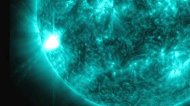Sun's magnetic field "is about to flip", warns NASA
The whole of the sun's magnetic field is about to "flip", according to NASA - with warning signs being spotted by observatories around the world this year.
By Rob Waugh | Yahoo! News – Tue, Aug 6, 2013
The whole of the sun's magnetic field is about to "flip", according toNASA - with warning signs being spotted by observatories around the world this year.
This "flip" happens every 11 years, and coincides with the greatest solar activity in the "cycles" of the sun, known as "Solar Maximum" - with sunspots and "coronal mass ejections" on the surface of the sun.
"It looks like we're no more than 3 to 4 months away from a complete field reversal," says solar physicist Todd Hoeksema of Stanford University. "This change will have ripple effects throughout the solar system."
The effects are so powerful they will be felt beyond Pluto - and may affect phenomena such as cosmic rays, which some believe can alter the climate on Earth.
Scientists have recorded these "flips" for decades, but the process is still not fully understood. This particular "flip" has already puzzled scientists - with one magnetic pole of the sun appearing to flip "too early" last year.
[Related: First lab-grown burger "tastes like cake"]
"Right now, there's an imbalance between the north and the south poles," Jonathan Cirtain, a space scientist at NASA's Marshall Space Flight Center said last year. "The north is already in transition, well ahead of the south pole, and we don't understand why."
The flips, though, are regular. The sun's magnetic field changes polarity roughly every 11 years - caused by the magnetic dynamo inside the sun reorganising itself.
Magnetograms at Stanford's Wilcox Solar Observatory - one of the few observatories that track the sun's magnetic fields - have been tracking the sun's polar magnetism since 1976, and they have recorded three grand reversals, with a fourth in the offing.
Solar physicist Phil Scherrer, also at Stanford, describes what happens: "The sun's polar magnetic fields weaken, go to zero, and then emerge again with the opposite polarity. This is a regular part of the solar cycle."
The sun's magnetic influence (also known as the "heliosphere") extends billions of kilometers beyond Pluto - changes to the field's polarity ripple all the way out to NASA's Voyager probes, on the doorstep of interstellar space.
When solar physicists talk about solar field reversals, their conversation often centers on the "current sheet."
The current sheet is a sprawling surface jutting outward from the sun's equator where the sun's slowly-rotating magnetic field induces an electrical current.
During field reversals, the current sheet becomes very wavy - Scherrer likens the undulations to the seams on a baseball. As Earth orbits the sun, we dip in and out of the current sheet. Transitions from one side to another can stir up stormy space weather around our planet.
Cosmic rays are also affected. These are high-energy particles accelerated to nearly light speed by supernova explosions and other violent events in the galaxy.
Cosmic rays are a danger to astronauts and space probes, and some researchers say they might affect the cloudiness and climate of Earth.
The current sheet acts as a barrier to cosmic rays, deflecting them as they attempt to penetrate the inner solar system. A wavy, crinkly sheet acts as a better shield against these energetic particles from deep space.
As the field reversal approaches, data from Wilcox show that the sun's two hemispheres are out of synch.
"The sun's north pole has already changed sign, while the south pole is racing to catch up," says Scherrer. "Soon, however, both poles will be reversed, and the second half of Solar Max will be underway."
This "flip" happens every 11 years, and coincides with the greatest solar activity in the "cycles" of the sun, known as "Solar Maximum" - with sunspots and "coronal mass ejections" on the surface of the sun.
"It looks like we're no more than 3 to 4 months away from a complete field reversal," says solar physicist Todd Hoeksema of Stanford University. "This change will have ripple effects throughout the solar system."
The effects are so powerful they will be felt beyond Pluto - and may affect phenomena such as cosmic rays, which some believe can alter the climate on Earth.
Scientists have recorded these "flips" for decades, but the process is still not fully understood. This particular "flip" has already puzzled scientists - with one magnetic pole of the sun appearing to flip "too early" last year.
[Related: First lab-grown burger "tastes like cake"]
"Right now, there's an imbalance between the north and the south poles," Jonathan Cirtain, a space scientist at NASA's Marshall Space Flight Center said last year. "The north is already in transition, well ahead of the south pole, and we don't understand why."
The flips, though, are regular. The sun's magnetic field changes polarity roughly every 11 years - caused by the magnetic dynamo inside the sun reorganising itself.
Magnetograms at Stanford's Wilcox Solar Observatory - one of the few observatories that track the sun's magnetic fields - have been tracking the sun's polar magnetism since 1976, and they have recorded three grand reversals, with a fourth in the offing.
Solar physicist Phil Scherrer, also at Stanford, describes what happens: "The sun's polar magnetic fields weaken, go to zero, and then emerge again with the opposite polarity. This is a regular part of the solar cycle."
The sun's magnetic influence (also known as the "heliosphere") extends billions of kilometers beyond Pluto - changes to the field's polarity ripple all the way out to NASA's Voyager probes, on the doorstep of interstellar space.
When solar physicists talk about solar field reversals, their conversation often centers on the "current sheet."
The current sheet is a sprawling surface jutting outward from the sun's equator where the sun's slowly-rotating magnetic field induces an electrical current.
During field reversals, the current sheet becomes very wavy - Scherrer likens the undulations to the seams on a baseball. As Earth orbits the sun, we dip in and out of the current sheet. Transitions from one side to another can stir up stormy space weather around our planet.
Cosmic rays are also affected. These are high-energy particles accelerated to nearly light speed by supernova explosions and other violent events in the galaxy.
Cosmic rays are a danger to astronauts and space probes, and some researchers say they might affect the cloudiness and climate of Earth.
The current sheet acts as a barrier to cosmic rays, deflecting them as they attempt to penetrate the inner solar system. A wavy, crinkly sheet acts as a better shield against these energetic particles from deep space.
As the field reversal approaches, data from Wilcox show that the sun's two hemispheres are out of synch.
"The sun's north pole has already changed sign, while the south pole is racing to catch up," says Scherrer. "Soon, however, both poles will be reversed, and the second half of Solar Max will be underway."


No comments:
Post a Comment